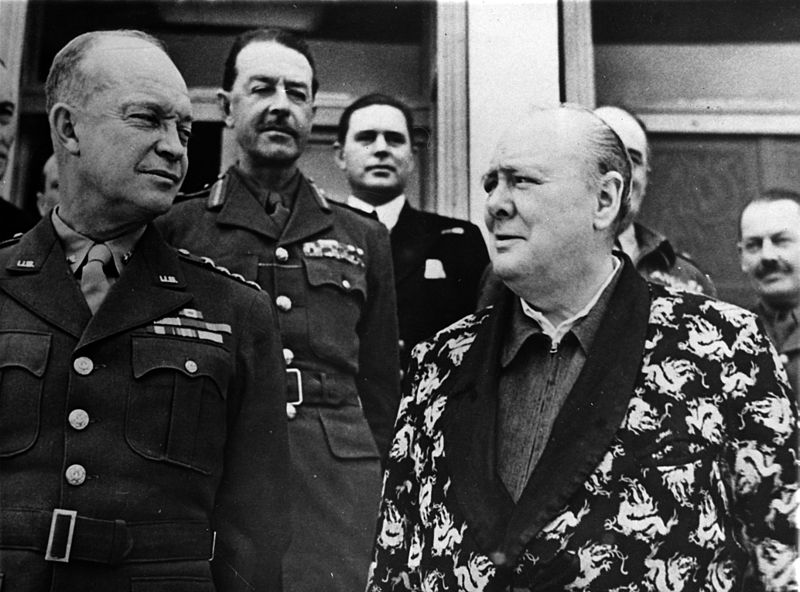
Winston Churchill on Health Care (1): “The Inheritance of All”
Q: Churchill on health care
(Updated from 2009). A statement by Churchill on health care has been offered to show that he would support U.S. heath care reforms. My Catholic parish published the aforementioned statement in its weekly bulletin.
“What Would Churchill Do? Here’s an interesting quote. It’s from former British Prime Minister Winston Churchill explaining his view on health care and government in 1948. ‘The discoveries of healing science must be the inheritance of all. That is clear. Disease must be attacked, whether it occurs in the poorest or the richest man or woman simply on the ground that it is the enemy. And it must be attacked just in the same way as the fire brigade will give its full assistance to the humblest cottage as readily as to the most important mansion….
‘Our policy is to create a national health service in order to ensure that everybody in the country, irrespective of means, age, sex, or occupation, shall have equal opportunities to benefit from the best and most up-to-date medical and allied services available.'”
The heading and quotation imply that we Catholics should support national health care. I lack the rhetorical context and knowledge of conditions existing in Britain those many years ago. So I am wondering: what was Churchill’s actual position on national health care? —J.R., Chicago
A: Considering what he said
We tend to deprecate articles suggesting that Churchill would do this or that about modern situations. His daughter always asked people who say such things: “How do you know?” The answer is, of course, we don’t know.
The Churchill quotation is not from 1948, but from his tribute to the Royal College of Physicians on 2 March 1944. (Complete text available by email.)
You need to decide whether the excerpts joined together in your church bulletin are in context. (I have inserted the break.) You are right to suggest that health care and conditions in Britain in 1944 were different. (They were far more critical than conditions in the USA today.) Also, in 1944, the words “national health service” did not necessarily mean what the Labour government created after the war. Nor do they define what occurred in America. Whatever its merits or demerits, Obamacare was not a British National Health Service. The argument when it was up for debate was over whether it might lead to problems similar to the British system.
Inheritance and entitlement
Churchill believed that medical discoveries are “the inheritance of all.” That leaves a fairly wide array of options. On 3 July 1945, too late to affect the general election (which came two days later), he issued a Cabinet Paper. It called for legislation for National Insurance and a National Health Service. But in 1945 the Conservative Party lost the general election. The Labour Party took over and created their own plan. To some, “National Insurance” means an alternative to “National Health Service.” A citizen might have, for example, a medical savings account accruing to through paycheck withholding. The miracle of compound interest is a great thing.
Churchill did not stridently oppose Labour’s National Health Service, though he was not an advocate. In the beginning, everything was to be free, of course. When costs began to rise, the Chancellor of the Exchequer introduced charges for spectacles and dentures. Churchill then protested the heavy government expenditures (10 April 1951). The money, he argued, should come from reductions elsewhere:
Those who hold that taxation is an evil must recognize that it falls upon this country in a most grievous manner at the present time, continually burdening the mass of the nation and continually clogging—or, at any rate, hampering our efforts. There is to be an increase of taxation. I am not at all concerned today to examine even cursorily the detailed proposals which the Chancellor has made, but taxation is to be increased; it is to be heavier still. Naturally, many people will feel that the issue should be argued out very tensely as to whether other economies in Government expenditure might not have relieved us from the need of applying new burdens and new taxation. Of course, we know the times are difficult.
Further reading
Churchill was thus arguing for decreased government expenditures instead of higher taxes as the better approach to the problem. In 1945, it had seemed much easier to solve. He considered socialism—a far milder form than we know today—incompatible with human liberty. He sought a way of ameliorating the complaints of the poor (or relatively poor) without confiscating the wealth of those who produce it. To this end you may be interested in an erudite study on this matter by Larry Arnn, President of Hillsdale College: Churchill’s Trial: Winston Churchill and the Salvation of Free Government.
For a bone of contention about the Churchill passage above, see Part 2 of this discussion.







One thought on “Winston Churchill on Health Care (1): “The Inheritance of All””
Good article. I didn’t know that cost concerns set in so quickly with Britain’s National Health Service, but I’m not surprised. It’s a lesson we failed to learn here. In 1965 Medicare was projected to cost $12 billion by 1990. The actual cost was $108 billion. The only way to avoid federal bankruptcy from healthcare costs and keep the current Medicare and Medicaid programs is to keep the healthcare for the rest of the people in the private sector with no government financial responsibility. Obamacare was intended to be an income redistribution scheme via the federal government that destroyed the private sector and handed the management of the health care sector over to the bureaucrats who regulate every transaction no matter how small. Of course we can’t tell, but I don’t think it’s a stretch to believe that WSC would have opposed it.
Comments are closed.